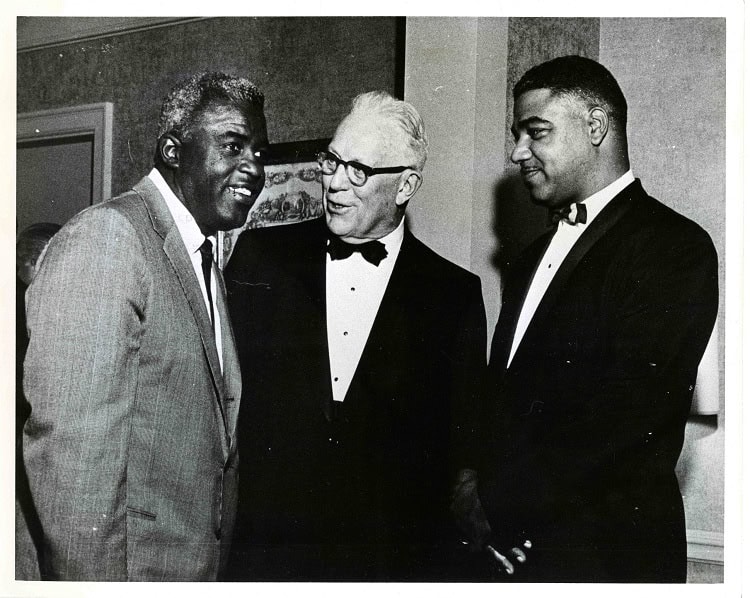
Whitney M. Young Jr. (far right) with Jackie Robinson (left) and Chief Justice Earl Warren (center). Photo credit: Columbia University Office of Public Affairs photograph collection, University Archives
By John Nolon
Watching Major League Baseball celebrate Jackie Robinson day on April 15 reminded me of when I once met him along with Roy Echols, a community organizer in Yonkers, NY.
When I returned from serving in the Peace Corps in Guatemala in 1969, I had been accepted as a Reginald Heber Smith Community Law Fellow to work in an Office of Economic Opportunity funded legal services program. I was randomly assigned to work in Yonkers providing legal assistance to the Community Action Program and its staff. During my first week there, Roy Echols, a very large and determined CAP staffer came into my office, slapped his large fist on my small desk, cursed the lack of affordable shelter, and told me we were going to build affordable housing and that I needed to figure out how to do it.
We formed a not for profit called the Yonkers Community Improvement Corporation (YCIC) and rented a storefront on Warburton Avenue. I boned up on housing development and finance, we found a deteriorated park in the Hollows neighborhood, got it released by the state legislature from the state’s public trust requirements, and found a developer cosponsor to build two 12 story buildings with 195 low income housing units on that parcel.
We spoke to Whitney Young’s widow and got her permission to use the name of her late husband, an American civil rights leader, for the project. She asked that we interview Jackie Robinson who, by then, was long retired from baseball and had a construction company. Our storefront was small, the Warburton Avenue neighborhood was littered and poorly lighted (frankly scary) at night, but it was there early one evening in 1971 that we met with Jackie, his wife, and construction manager and agreed to a term sheet for a contract to construct Whitney Young Manor. It provided shelter to lower income families for over 30 years, was purchased by a new developer, Omni New York, in 2006, underwent an 11 million dollar restoration, and continues to be rented to low income households. Today a 1,320 sq. ft. apartment rents to a family of four with income under $77,000 for rents of around $2,000/month. I’d estimate that over 600 individuals have obtained shelter in the Manor for nearly 50 years. Roy, (if you are reading this), that’s 10,950,000 individual nights of shelter.
Having learned about affordable housing development, I was hired by the City of Yonkers as Deputy Corporation Counsel and the Deputy Director of the Department of Planning and Development and helped develop more housing. In 1974, I was recruited to set up and run the Housing Action Council, which is still working today building and rehabilitating lower income housing. I’d estimate that the Housing Council’s work has resulted in 15,000 units of low and moderate housing in the nearly 50 years it has existed, providing shelter for another 45,000 individuals.
Jackie Robinson’s contributions are well known and widely respected. Roy’s hand slap on my desk and the contagious energy of his determination, not so much. It was a small chance event that resulted in significant change, providing shelter for so many and teaching that our individual actions can count.
John R. Nolon is Distinguished Professor of Law Emeritus at the Elisabeth Haub School of Law at Pace University where he supervises student research and publications regarding land use, sustainable development, climate change, housing insecurity, racial inequity, and the coronavirus pandemic. He is Co-counsel to the Law School’s Land Use Law Center, which he founded in 1993. He served as Adjunct Professor of land use law and policy at the Yale School of the Environment from 2001-2016. Before he joined the law school faculty, he founded and directed the Housing Action Counsel to foster the development of affordable housing.





